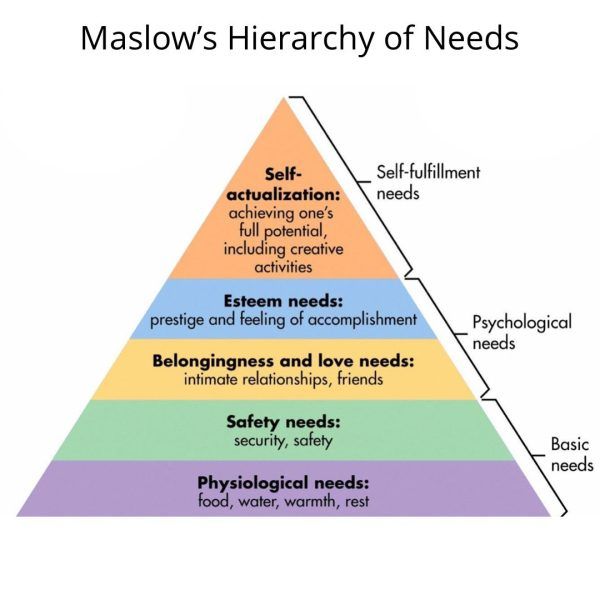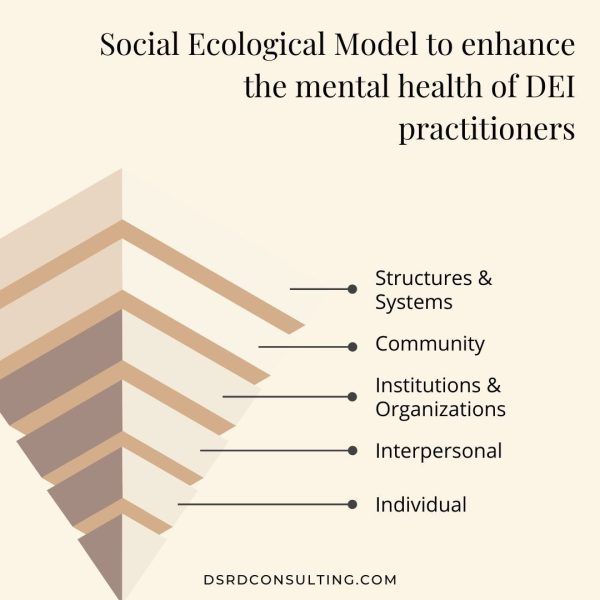Humans have needs. There’s a hierarchy of them.
👉 Stress and overwhelm result from unmet needs or pain (unmet need to be free from pain). Or as Buddhism might put it: attachment to desire (expectation versus reality).
👉 Trauma results from chronic stress and lack of agency.
👉 Complex trauma results from trauma or neglect as a child and your nervous system experiences emotional flashbacks. (Then your Inner 7-year hijacks your brain!)
The reality is that we live in a world where it is difficult (to impossible) to have needs met for a significant number of people.
Traumatized people are in a constant state of fight-flight-freeze because they are trying to get their needs met. Not getting needs met means danger to their survival. People in survival mode may be able to figure out how to survive an acute danger, but when it’s chronic, it really messes with our physical and mental health. What a viscous cycle!
And when we start factoring in intergenerational trauma, neurodiversity, systemic discrimination… we can see how hard life can be for people dealing with multiple levels of stress, overwhelm, and trauma.
So when someone says: ‘You should practice self care.’ Or ‘You should love yourself.’ Or ‘Let’s use mindfulness.’ Or.. ‘Calm down! Just breathe!’ Or ‘Just let it go.’ … you could be forgiven for wanting to yell back and say: THAT IS NOT GOING TO SOLVE MY PROBLEM!
💣 When people cannot have basic physiological and safety needs met CHRONICALLY, they are experiencing trauma.
💣 When employers are NONSTOP asking people to do more than they are capable of, they are causing trauma.
💣 If people ALWAYS expect to get things done that require more resources than they have (time, money, energy, headspace), they will over time, experience trauma.
Chronic unmet needs = trauma in SLO-MO.
This is happening at a global level (magnified during pandemic), societal level, family level… but we are asking people to deal with it at an individual level. We are asking people to take responsibility to fix their mental health, as if they can control all the things that caused them their problems leading to chronic unmet needs.
Fundamentally, people who have an undamaged/healthy nervous system because they’ve experienced less trauma or have healed from trauma are PRIVILEGED. They have an advantage in life because they have health, grit, resilience, and hope to deal with life.
NOTE:
✨We have no idea what state someone’s nervous system is in.
✨ We have no idea what chronic unmet need someone struggles with.
✨ We can only assume that everyone is doing their best.
🙏 Employers can make this worse by expecting more from people than they can realistically do OR they can support them to success. (DSRD Consulting depicts a model for DEI practitioners... hint: it is relevant for everyone.)
👉 Stress and overwhelm result from unmet needs or pain (unmet need to be free from pain). Or as Buddhism might put it: attachment to desire (expectation versus reality).
👉 Trauma results from chronic stress and lack of agency.
👉 Complex trauma results from trauma or neglect as a child and your nervous system experiences emotional flashbacks. (Then your Inner 7-year hijacks your brain!)
The reality is that we live in a world where it is difficult (to impossible) to have needs met for a significant number of people.
Traumatized people are in a constant state of fight-flight-freeze because they are trying to get their needs met. Not getting needs met means danger to their survival. People in survival mode may be able to figure out how to survive an acute danger, but when it’s chronic, it really messes with our physical and mental health. What a viscous cycle!
And when we start factoring in intergenerational trauma, neurodiversity, systemic discrimination… we can see how hard life can be for people dealing with multiple levels of stress, overwhelm, and trauma.
So when someone says: ‘You should practice self care.’ Or ‘You should love yourself.’ Or ‘Let’s use mindfulness.’ Or.. ‘Calm down! Just breathe!’ Or ‘Just let it go.’ … you could be forgiven for wanting to yell back and say: THAT IS NOT GOING TO SOLVE MY PROBLEM!
💣 When people cannot have basic physiological and safety needs met CHRONICALLY, they are experiencing trauma.
💣 When employers are NONSTOP asking people to do more than they are capable of, they are causing trauma.
💣 If people ALWAYS expect to get things done that require more resources than they have (time, money, energy, headspace), they will over time, experience trauma.
Chronic unmet needs = trauma in SLO-MO.
This is happening at a global level (magnified during pandemic), societal level, family level… but we are asking people to deal with it at an individual level. We are asking people to take responsibility to fix their mental health, as if they can control all the things that caused them their problems leading to chronic unmet needs.
Fundamentally, people who have an undamaged/healthy nervous system because they’ve experienced less trauma or have healed from trauma are PRIVILEGED. They have an advantage in life because they have health, grit, resilience, and hope to deal with life.
NOTE:
✨We have no idea what state someone’s nervous system is in.
✨ We have no idea what chronic unmet need someone struggles with.
✨ We can only assume that everyone is doing their best.
🙏 Employers can make this worse by expecting more from people than they can realistically do OR they can support them to success. (DSRD Consulting depicts a model for DEI practitioners... hint: it is relevant for everyone.)


Effective. | Trauma. | Recovery. | Found Here.
Learn more about complex trauma recovery coaching with Linda. For those taking a proactive approach to recovery and needing answers to help heal their whole self.

